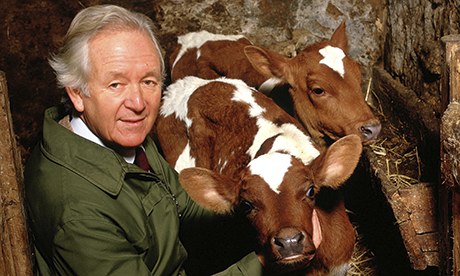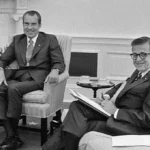Blog Post
The untold stories of James Herriot
By Jonathon Van Maren
When I asked Alf Wight’s son why his father’s books were still so popular decades after his death in 1995, Jim had an answer at the ready. His father—popularly known by the penname James Herriot—wrote about real things. The pages of his eight books—the first of which was If Only They Could Talk, published in 1970—are filled with real people, simpler times, bad weather, and cantankerous and lovable animals that Wight says are often as relatable as the men and women, if not more so. In fact, Wight said with amusement, his father often observed that people came to resemble their dogs.
Herriot graduated from Glasgow Veterinary College in 1939 and returned to England to become a vet in Yorkshire country in January 1940. His boss, Donald Sinclair (Siegfried Farnon in the books) owned a practice at 23 Kirkgate in Thirsk, and he asked Herriot to look after it while he took his RAF training. Herriot married Joan Catherine Anderson Danbury (Helen) on November 5, 1941 and they had two children: James (Jim) in 1943 and Rosemary in 1947. A year after his marriage, Herriot also trained with the RAF, but was discharged as a leading aircraftman for medical reasons in July 1943. Herriot stayed with the practice for almost fifty years, even after the massive success of his semi-autobiographical books set in the 1930s-1950s Yorkshire Dales.
The nostalgia incurred by Herriot’s stories is often more than a little unrealistic. Frequently, vets in those days found themselves stripped to the waist in some wind-blasted meadow high in the dales in the icy dead of night with their arms sunk up to the shoulder inside a cow. Working nights and weekends was the norm. This, says Wight, who worked as a vet with his father for decades, is a story one prefers to read rather than experience. “The general public hankers back after the Herriot days,” he told me with a chuckle. “They look back very nostalgically at a pace of life that was a bit slower. But they weren’t such good old days at the time, were they?”
But talking to Wight brings out a good dose of his own nostalgia—especially as the characters in Herriot’s books have all since been gathered to their people. “They’ve all gone.” They are, however, still as bright in Wight’s memory as they are in the pages of Herriot’s books. “Tristan; Siegfried; Mrs. Pumphrey—they just jump out of the pages,” he said. It was Herriot’s skill at describing people that outed him as the author. He’d made his son promise not to reveal that he’d written the first book, but in Wight’s memory, this lasted less than a month. He was at the local marketplace shortly after publication day when a farmer came up to him.
“I’ve just read a book by a vet named Herriot,” the man told him.
“Oh?” said Wight, who’d hadn’t said a word to anyone.
The farmer nodded. “It’s your dad, isn’t it?”
“What makes you think that?”
“Come on,” the farmer replied. “The way he described Siegfried? That’s Donald Sinclair to a tee!”
Donald Sinclair, as it turned out, disapproved of the way his business partner portrayed him due to his inability to recognize himself in the gruff but lovable character Herriot had rendered in the books. “This book is a test of our friendship,” he told Herriot. “This was difficult for my dad, since he didn’t want to upset Donald,” Wight told me. “So he actually toned him down. I worked with him for 25 years. He was my godfather. He was Uncle Donald. The reason he was such an eccentric character was that he didn’t think he was. It was unconscious.” He would easily blow his stack at anyone—except for children. If a child came to the practice with a pet, “suddenly, he’d switch it off” and turn into a tender father figure.
The stories about Sinclair’s legendary blow-ups at his brother Brian—Tristan—were also true, but Wight found out when researching for a biography of his father why this was. The younger Sinclair, it turned out, had begun his veterinary college studies in 1933, but only passed his final exams and qualified in 1943. Each failure cost Donald precious money that he didn’t have. “It is true that Donald—Siegfried—was always shouting at his younger brother. But no wonder! He had a very good reason to shout at him. Brian Sinclair was one of the best friends my father ever had. They kept in touch right to their dying days. He didn’t go into veterinary practice. He qualified in ’43, went straight on to join the Royal Army Corps, and then ended up at the Ministry of Agriculture. Stripping to the waist in the middle of the night wasn’t for him.”
Donald Sinclair was not skilled at processing his emotions. “When my father died, he didn’t call.” Wight said. “It hit him hard because they were good friends. There was silence for a whole week. Then the phone rang. I said, ‘Hello, Donald.’ All he said was: ‘I’m fed up about your dad.’ Then, gone. The phone was down. That was typical of him. So I knew how he felt.”
Wight says that the portrayals of most characters in the book—with the exception of his mother, who was a local secretary turned into a farmer’s daughter at the insistence of an American publisher—are accurate. The small-animal vet Granville Bennett—his real name was Denton Pette—is rendered perfectly. “A big man with a big personality,” Wight recalled. “The practice used to send him all the difficult cases with dogs and cats; a big drinker and socializer. He wasn’t a womanizer but he loved the good life. I saw practice with him when I was a student and he could be carousing into the early hours of the morning but he was always dead on time for his surgeries the next morning, immaculately dressed in a suit, not a pinstripe out of place. I only survived for five days and I was diagnosed with alcohol poisoning.”
I asked Wight if there were any stories that hadn’t made it into the books. Not many, he replied—but there were a few. In one instance, Herriot was up at a farm with a colleague to remove a dead calf from a cow. “They couldn’t do it. My dad recommended that the cow be shot.” A farmhand turned up with a penknife and cut the calf to pieces and extracted it, and the two vets were certain that “this was the end of their careers—a farm worker could do a job they couldn’t do!” A month later at a neighboring farm, a farmer commented to them: “I heard about you lads.” Herriot was nervous, but it turned out that the cow died shortly after the botched operation—and that if they’d shot the cow as he’d recommended, the farmer would at least have gotten money for it. The worry was for nothing.
Another story he recalled was an example of the hospitality of the farm folk. Herriot was heading up the lane to a farm in the Dales when he met the postman, Peter New. “There’s two gates to open, Peter, so I’ll take this letter because I’m going up to see a sheep,” he offered.
“Oh no, Mr. Wight, I’m sorry you can’t do that. It’s against regulations. If anything happened to the letters…”
“Come on, Peter, I’ve known you since you were knee-high. I’ll take it,” Herriot chided.
“Oh no, Mr. Wight,” the mailman insisted.
The two headed up the lane to the farm together, and Peter delivered the letter. When Herriot finished with lambing, he headed into the kitchen to wash his hands and discovered the postman ensconced there, tucking into bacon, eggs, black sausages, and tomatoes. “So it’s the rules and regulations eh Peter?” Herriot laughed at the unabashed fellow. “My ass!”
Much of the landscape and community that Herriot described is now gone, as are the people. It is nostalgic, Wight told me, to drive around the countryside today and see how much things have changed. One famous story Herriot tells is of a farm with seven gates which buffeted him high and low as he climbed out of his car into the icy wind every several yards to open the next one. That farm, says Wight, is “one of the many, many farms that is no longer. The gates have gone now. There’s a long driveway and a big fancy house. In those days when you went up to the old house it said 1656 above the doorway. It belonged to a highwayman. It was a different world.”
But the attitude of gratitude and simple living embodied by James Herriot is still attainable. As Jim Wight told me for a column on his father for First Things, Herriot was always thrilled with what he was given, and refused to leave the Dales even when he was rich and the government was taking nearly all of the proceeds from his books. He simply saw no reason to leave—here was work he loved, people he loved, and countryside of matchless beauty. What more could a man want?
For me, James Herriot’s stories often remind me of what the Dutch journalist Geert Mak describes in his elegy for the vanishing farms of the Netherlands, Island in Time. While visiting farmers and drinking piping hot cups of coffee around kitchen tables, Mak writes, the men and women would drift backwards on a tide of memory. “By the end of the evening,” Mak recalled, “the talk would have turned once again to land, livestock, and open air. And the cowsheds were still redolent of the ancient smell of milk, mixed with hay and a whiff of dung, the sweet fragrance that is both timeless and of all times, and that can drive a person mad with nostalgia for something he has never known.”









It was a real pleasure to read your article; great selection of anecdotes and quotes.
Thank you!
I first heard about the books when I was a 13 year old, working for a vet in a small practice. I worked at a horse farm after that. Re-reading the books 50 years later, I can remember the sounds, smells, and emotions of that life that I loved and miss.
I was born 1957 Syd Australia was visiting a sister whom resides South Ild N/ Zealand in 2017. She bought the hard copy of all 6 story’s for $1 from an opp shop. Ended up in Aus at Dads in 18. Read it then and am reading it now and i honestly havent laughed like this for quite sometime. It’s Brillant. Funny , at time’s Sad and i have no troubles relating to the 1930’s , the people , their funny and different way’s. Ive alway’s felt deep in my core ive perhaps wandered within other decades and places accross England.. How i would have loved to have meet those 3 Gentleman or been a fly on there travels.. Thank you Alf Wight , Donald and Brian and all the amazing Characters , animals etc with their incredible stories of life , sruggles , personalites to boot and kindness that only occured in days of Past… thanking you too Jonathan for sharing. Blessings Terri